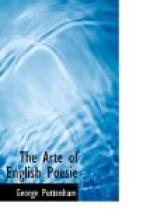Gentlemen, whose names I do not omit for enuie, but
to auoyde tediousnesse, and who haue deserued no little
commendation. But of them all particularly this
is myne opinion, that Chaucer, with Gower,
Lidgat and Harding for their antiquitie
ought to haue the first place, and Chaucer
as the most renowmed of them all, for the much learning
appeareth to be in him aboue any of the rest.
And though many of his bookes be but bare translations
out of the Latin & French, yet are they wel handled,
as his bookes of Troilus and Cresseid,
and the Romant of the Rose, whereof he translated but
one halfe, the deuice was Iohn de Mehunes a
French Poet, the Canterbury tales were Chaucers
owne inuention as I suppose, and where he sheweth
more the naturall of his pleasant wit, then in any
other of his workes, his similitudes comparisons and
all other descriptions are such as can not be amended.
His meetre Heroicall of Troilus and Cresseid
is very graue and stately, keeping the staffe of seuen,
and the verse of ten, his other verses of the Canterbury
tales be but riding ryme, neuerthelesse very well
becoming the matter of that pleasaunt pilgrimage in
which euery mans part is playd with much decency.
Gower sauing for his good and graue moralities,
had nothing in him highly to be commended, for his
verse was homely and without good measure, his wordes
strained much deale out of the French writers, his
ryme wrested, and in his inuentions small subtillitie:
the applications of his moralities are the best in
him, and yet those many times very grossely bestowed,
neither doth the substance of his workes sufficiently
aunswere the subtilitie of his titles. Lydgat
a translatour onely and no deuiser of that which he
wrate, but one that wrate in good verse. Harding
a Poet Epick or Historicall, handled himselfe well
according to the time and maner of his subiect.
He that wrote the Satyr of Piers Ploughman, seemed
to haue bene a malcontent of that time, and therefore
bent himselfe wholly to taxe the disorders of that
age, and specially the pride of the Romane Clergy,
of whose fall he seemeth to be a very true Prophet,
his verse is but loose meetre, and his termes hard
and obscure, so as in them is litle pleasure to be
taken. Skelton a sharpe Satirist, but with
more rayling and scoffery then became a Poet Lawreat,
such among the Greekes were called Pantomimi,
with vs Buffons, altogether applying their wits to
Scurrillities & other ridiculous matters. Henry
Earle of Surrey and Sir Thomas Wyat, betweene
whom I finde very litle difference, I repute them
(as before) for the two chief lanternes of light to
all others that haue since employed their pennes vpon
English Poesie, their conceits were loftie, their stiles
stately, their conueyance cleanely, their termes proper,
their meetre sweete and well proportioned, in all
imitating very naturally and studiously their Maister




